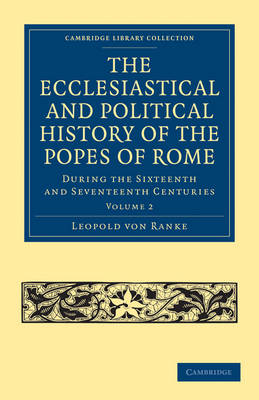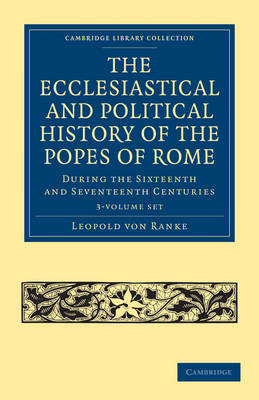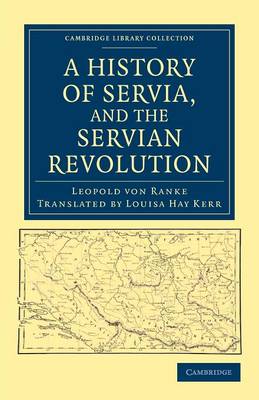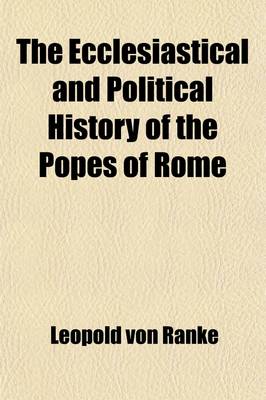Cambridge Library Collection - European History
1 primary work • 6 total works
Volume 2
The Ecclesiastical and Political History of the Popes of Rome
by Leopold Von Ranke
Published 19 September 2009
This translation by Sarah Austin (1793-1867) of German historian Leopold von Ranke's work contributed significantly to early modern history and historiography. By some accounts 'the best living translator' of her time, Austin was a member of circles that included Jeremy Bentham and J. S. Mill. Ranke (1795-1886) worked for most of his life at the University of Berlin, writing several histories covering the fifteenth to seventeenth centuries. Austin's translation recognises Ranke's importance to Western historiography: his methodology stressed the centrality of using primary sources and of the historian's objectivity. Ranke's history engages with a much wider area than his title suggests; indeed, his subject is 'the struggle between Catholicism and Protestantism, between authority and innovation', as Austin writes. Volume 2 is almost wholly concerned with the Counter-Reformation (and coins the term), from 1563 to 1630. These volumes will be of interest to early modern historians and historiographers alike.
The Ecclesiastical and Political History of the Popes of Rome 3 Volume Paperback Set
by Leopold Von Ranke
Published 12 May 2011
This translation by Sarah Austin (1793-1867) of German historian Leopold von Ranke's three-volume work contributed significantly to early modern history and historiography. By some accounts 'the best living translator' of her time, Austin was a member of social circles that included Jeremy Bentham and J. S. Mill. Ranke (1795-1886) worked for most of his life at the University of Berlin, writing several histories covering the fifteenth to seventeenth centuries. (His six-volume History of England is also reissued in this series.) Austin's translation recognises Ranke's importance to Western historiography: his influential methodology stressed the centrality of using primary sources and of the historian's objectivity. Ranke's history engages with a much wider area than his title suggests; indeed, his subject is 'the struggle between Catholicism and Protestantism, between authority and innovation', as Austin writes. These volumes will be of interest to early modern historians and historiographers alike.
The German historian Leopold von Ranke (1795-1886) is considered a founder of modern source-based history, introducing ideas such as reliance on primary sources, emphasis on narrative history and international perspectives. (His works on the history of England and the on papacy are also reissued in this series.) While historiography and empiricism, as practised by Ranke, are now considered outdated, his emphasis on primary sources and the use of quotations to illustrate arguments remains hugely influential. First published in German in 1829, this work was based on eye-witness accounts of the Serbian Uprising of 1804, and was one of the first modern works on the Balkan nation. The early chapters review the history of the Serbs from the ninth century CE, to contextualise the chapters on the sixteenth-century Ottoman conquest and subsequent rule. This translation, published in 1847, is based on the second German edition of 1844.
The Ecclesiastical and Political History of the Popes of Rome (Volume 2)
by Leopold Von Ranke
Published 5 August 2011
This translation by Sarah Austin (1793-1867) of German historian Leopold von Ranke's work contributed significantly to early modern history and historiography. By some accounts 'the best living translator' of her time, Austin was a member of circles that included Jeremy Bentham and J. S. Mill. Ranke (1795-1886) worked for most of his life at the University of Berlin, writing several histories covering the fifteenth to seventeenth centuries. Austin's translation recognises Ranke's importance to Western historiography: his methodology stressed the centrality of using primary sources and of the historian's objectivity. Ranke's history engages with a much wider area than his title suggests; indeed, his subject is 'the struggle between Catholicism and Protestantism, between authority and innovation', as Austin writes. Volume 2 is almost wholly concerned with the Counter-Reformation (and coins the term), from 1563 to 1630. These volumes will be of interest to early modern historians and historiographers alike.
The Ecclesiastical and Political History of the Popes of Rome: Volume 3
by Leopold Von Ranke
Published 5 November 2011
This translation by Sarah Austin (1793-1867) of German historian Leopold von Ranke's work contributed significantly to early modern history and historiography. By some accounts 'the best living translator' of her time, Austin was a member of social circles that included Jeremy Bentham and J. S. Mill. Ranke (1795-1886) worked for most of his life at the University of Berlin, writing several histories covering the fifteenth to seventeenth centuries. Austin's translation recognises Ranke's importance to Western historiography: his methodology stressed the centrality of using primary sources and of the historian's objectivity. Ranke's history engages with a much wider area than his title suggests; indeed, his subject is 'the struggle between Catholicism and Protestantism, between authority and innovation', as Austin writes. Volume 3 analyses the period 1590-1630 and examines later significant events and includes an expansive appendix. These volumes will be of interest to early modern historians and historiographers alike.
The Ecclesiastical and Political History of the Popes of Rome: Volume 1
by Leopold Von Ranke
Published 5 August 2011
This translation by Sarah Austin (1793-1867) of German historian Leopold von Ranke's work contributed significantly to early modern history and historiography. By some accounts 'the best living translator' of her time, Austin was a member of social circles that included Jeremy Bentham and J. S. Mill. Ranke (1795-1886) worked for most of his life at the University of Berlin, writing several histories covering the fifteenth to seventeenth centuries. Austin's translation recognises Ranke's importance to Western historiography: his methodology stressed the centrality of using primary sources and of the historian's objectivity. Ranke's history engages with a much wider area than his title suggests; indeed, his subject is 'the struggle between Catholicism and Protestantism, between authority and innovation', as Austin writes. Volume 1 traces the impact and history of the popes from their 'epochs' to the sixteenth century. These volumes will be of interest to early modern historians and historiographers alike.




